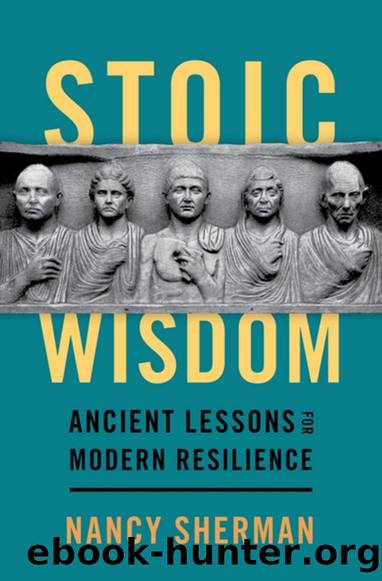Stoic Wisdom: Ancient Lessons For Modern Resilience by Nancy Sherman

Author:Nancy Sherman [Sherman, Nancy]
Language: eng
Format: epub
ISBN: 9780197501832
Barnesnoble:
Goodreads: 55332369
Publisher: Oxford University Press
Published: 2021-12-15T00:00:00+00:00
A Plea for Self-Mercy
Letâs return to the naval aviator Layne McDowell. There were no formal investigations of the incident over Kosovo. It is not clear whether by following fuller procedures, McDowell could have averted the accident. What we know is that McDowell, above all else, is his own judge and revisits the scene in flashbacks. He probably also revisits the scenes in his mind as he checks for accuracy in Chiversâs typed-up account of his quotes and then, later, his story, as Chivers narrates it, when he turns to reading the book.
What McDowell pictures is strikingly like what Seneca pictures in Astyanaxâs demiseâa young boyâs body shattered, the back of his head missing, an innocent made all too vulnerable in war. What we hope for on behalf of this navy pilot is some mitigation of the self-punishment, some leniency and self-empathy that allow for a way to move beyond the rage of distress without losing the moral meaning that comes from the anguish. What we hope for is self-mercy. We want him to be able to loosen the rage of his felt guilt by imagining if he would blame others as harshly as he blames himself. His feelings may be apt, but relentlessly harsh. As I have said, there is often asymmetry in how we hold self and others to account, especially, in the case of military moral injury: self-blame may be far harsher than blame for those who cover your back. But that opens a path for healing: We need to show ourselves the compassion we would show others in similar circumstancesâor, show ourselves what we imagine that they show us. The benevolence of the benevolent spectator, at times, needs to become part of the moral self.
There is a political lesson here, too. We who donât go to war need to start taking greater responsibility for the wars to which we send others to fight on our behalf. We need to carry the moral burden by doing a better job of knowing which causes of war are just and worth our nationâs most precious resources.
Seneca is a complex spokesperson for calm. What sometimes parades as conscience is the rumbling of the unconscious and its conflicts. He yearns for simplicity and tranquility at the same time he is attracted to the messy world of high-stakes power and hierarchy. Modern-day warriors (and many in frontline and emergency relief work) also live in complicated moral worldsâcommitted to excellence but working in institutions that vastly limit their individual control, exposed to situations that constantly test their best judgment and capacity for steady restraint. Exposure to moral injury is no surprise in those environments. But the Senecan lesson I have been urging is that this very injury may open the way for moral growth and the calm of repair. To read Stoicism as forswearing the possibility of âgoodâ moral distress is to miss Senecaâs more profound lessons for modern resilience.
Download
This site does not store any files on its server. We only index and link to content provided by other sites. Please contact the content providers to delete copyright contents if any and email us, we'll remove relevant links or contents immediately.
The remains of the day by Kazuo Ishiguro(8999)
Tools of Titans by Timothy Ferriss(8396)
Giovanni's Room by James Baldwin(7346)
The Black Swan by Nassim Nicholas Taleb(7129)
Inner Engineering: A Yogi's Guide to Joy by Sadhguru(6796)
The Way of Zen by Alan W. Watts(6614)
The Power of Now: A Guide to Spiritual Enlightenment by Eckhart Tolle(5782)
Asking the Right Questions: A Guide to Critical Thinking by M. Neil Browne & Stuart M. Keeley(5775)
The Six Wives Of Henry VIII (WOMEN IN HISTORY) by Fraser Antonia(5515)
Astrophysics for People in a Hurry by Neil DeGrasse Tyson(5190)
Housekeeping by Marilynne Robinson(4447)
12 Rules for Life by Jordan B. Peterson(4304)
Ikigai by Héctor García & Francesc Miralles(4274)
Double Down (Diary of a Wimpy Kid Book 11) by Jeff Kinney(4272)
The Ethical Slut by Janet W. Hardy(4253)
Skin in the Game by Nassim Nicholas Taleb(4249)
The Art of Happiness by The Dalai Lama(4130)
Skin in the Game: Hidden Asymmetries in Daily Life by Nassim Nicholas Taleb(4007)
Walking by Henry David Thoreau(3962)
